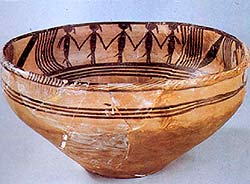Remote Antiquity to Slave Society (1.7 million years ago-476 B.C.)

China, one of the world's most ancient civilizations, has a recorded history of nearly 4,000 years.
A fossil anthropoid unearthed in Yuanmou in Yunnan Province, "Yuanmou Man," who lived approximately 1.7 million years ago, is China's earliest primitive man known so far. "Peking Man," who lived in the Zhoukoudian area near Beijing 600,000 years ago, was able to walk upright, make and use simple tools, and knew how to make fire. The Neolithic Age started in China about 10,000 years ago, and relics from this period can be found all over the country. Artificially grown rice and millet as well as farming tools have been found in the remains of Hemudu in Yuyao, Zhejiang Province, and Banpo, near Xi'an City, Shaanxi Province, respectively. These relics date back some 6,000-7,000 years.
The Xia Dynasty was founded in 2070 B.C. The center of its activities was the western section of modern Henan Province and the southern section of modern Shanxi Province, and its sphere of influence reached the northern and southern areas of the Yellow River. With the Xia Dynasty, China entered slave society. The following Shang (1600-1046 B.C.) and Western Zhou (1046-771 B.C.) dynasties saw further development of slave society. This era was followed by the Spring and Autumn (770-476 B.C.) and Warring States (475-221 B.C.) periods, characterized by the decline in power of the ruling house and struggles for power among regional powers, marking the transition from slave society to feudal society.
Chinese had mastered the technology of smelting bronze approximately 5,000 years ago and iron tools came into use during the Shang Dynasty, 3,000 years ago. White pottery and glazed pottery were produced. Silk production was considerably developed and the world's first figured inlaid silk weaving technique appeared. During the Spring and Autumn Period steel production technologies made their debut. During the Spring and Autumn and the Warring States periods, there was a great upsurge of intellectual activity, producing many famous philosophers, such as Lao Zi, Confucius, Mencius and Mo Zi, and the well-known military scientist Sun Wu.
 0 Comments
0 Comments







Comments